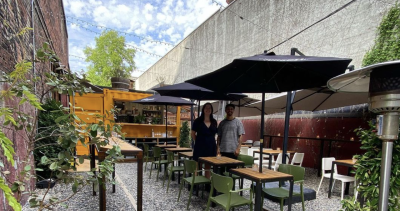Wet'suwet'en request legal observers before possible RCMP action
Wet'suwet'en leaders are calling for legal observers to join them at a camp and blockade on a remote forestry road in advance of possible "police enforcement" of a court-ordered injunction.
The request came in the form of a January 20 announcement on social media with a link to a signup form. A January 16 First Nations Leadership Council (FNLC) release expressed concerns about imminent RCMP action to dismantle the Gidimt'en camp and road blockade near an RCMP checkpoint established nearby more than a week earlier at kilometre 27 on the same unpaved Morice West Forest Service Road.
The Wet'suwet'en release noted: "Gidimt’en and Unist’ot’en are seeking legal observers. Our unceded Wet’suwet’en lands are under attack, with police enforcement of a colonial court injunction possible at any time. Hereditary Chiefs of all five Wet’suwet’en clans have rejected the injunction decision, which criminalizes Anuk ‘nu’at’en (Wet’suwet’en law), and have made clear that no access to Wet’suwet’en territories will be granted without free, prior, and informed consent."
The request stated further that the 50 to 60 needed observers should come from nearby areas, especially the towns of Houston and Smithers, should commit to as many as 10 hours per week at different sites, and should be "as self-sufficient as possible".
The observers will witness and monitor "the actions of law enforcement agencies and security forces" and obtain information "for the purposes of legal defence", the release explained. Training sessions will be held today (January 20) and on January 23 in Smithers, about 130 kilometres from the blockade.
The RCMP "access control checkpoint" was established in early January after a December 31, 2019, B.C. Supreme Court decision to extend an interim injunction granted a year before, one that led to a January 7, 2019, RCMP raid to dismantle the blockade that resulted in the arrests of 14 people.
That heavily armed raid happened after a similar RCMP checkpoint had been established to set up and enforce a temporary exclusion zone in support of the original injunction, which gave protesters three days to dismantle any road blockades that prevented Coastal GasLink employees from conducting preliminary pipeline construction work.
The Wet'suwet'en hereditary chiefs evicted Coastal GasLink workers from traditional territories in early January 2020, after the recent injunction extension.
Both the Unist'ot'en camp and the nearby Gidimt'en checkpoint, east of Unist'ot'en on the Morice West Forest Service Road, were built to protest and block pipeline construction through traditional Wet'suwet'en Nation territories. The Coastal GasLink natural-gas pipeline is scheduled to be built to ship product about 670 kilometres, from Dawson Creek to coastal Kitimat, from where it will be shipped to markets as liquefied natural gas (LNG).
The Unist'ot'en resistance camp was set up a decade ago, about 47 kilometres southwest of Houston in B.C.'s central Interior. The Unist'ot'en House group is part of the Big Frog clan of the Wet'suwet'en people, one of five such clans, each comprised of House groups and guided by hereditary chiefs.
Meanwhile, a two-hour water and land Wet'suwet'en support protest early this morning (January 20) that blocked the road outside of B.C. Ferries' Vancouver Island Swartz Bay terminal resulted in the cancellations of several sailings to the Mainland and the Gulf Islands before ending peacefully at about 9 a.m.















Comments